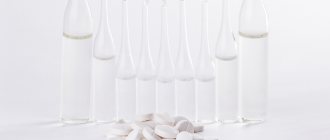We have all experienced pain in one way or another. It happens that it is fleeting and does not bring much discomfort, but it happens the other way around. Paroxysmal, recurring or constant. For such indications, pain medication is necessary.
Nimesil is used for toothache
Nimesil is a non-steroidal drug that has analgesic, anti-inflammatory and antipyretic effects. Nimesil is used as a symptomatic treatment of pain in dental, headache, menstrual, joint, muscle and postoperative pain, as well as in the treatment of injuries to soft tissues and the musculoskeletal system. The duration of the drug's effect is about 6 hours.
Nimesil can be used either once or for systemic therapy, that is, for a long (up to 15 days) course.
What is Nurofen syrup and tablets for?
The action of Nerofen is explained by the presence of ibuprofen in the composition, which, by acting on the thermostat in the brain, relieves fever and returns the temperature to normal values.
In addition, ibuprofen inhibits the synthesis of prostaglandins, which are mediators of pain. Which explains its analgesic effect. This is why Nurofen is indicated for:
- high body temperature;
- toothache;
- headache;
- muscle pain;
- for adverse reactions after DTP.
Adverse reactions
Side effect of the drug is visual disturbances
Like any medicine, Nimesil may have side effects:
- allergic reactions - sweating, rash, itching, erythema, anaphylactoid reactions, dermatitis, urticaria, erythema multiforme, angioedema, Stevens-Johnson syndrome, Lyell's syndrome;
- hematopoietic disorders - eosinophilia, pacitopenia, anemia, thrombocytopenia, hemorrhagic syndrome, thrombocytopenic purpura;
- visual disturbances – blurred vision;
- disorders of nervous activity - feelings of fear, dizziness, headache, nightmares, drowsiness, nervousness, encephalopathy;
- circulatory disorders - hot flashes, tachycardia, arterial hypertension, sudden changes in blood pressure;
- digestive system disorders - nausea, diarrhea, vomiting, flatulence, constipation, abdominal pain, gastritis, dyspepsia, tarry stools, stomatitis, bleeding from the digestive tract, gastric perforation or ulcer, duodenal perforation or ulcer, hepatitis, cholestasis, jaundice, increased levels of liver enzymes;
- breathing disorders - shortness of breath, attacks of bronchial asthma;
- general disorders – asthenia, general malaise, hypothermia;
- disorders of the genitourinary system - renal failure, hematuria, urinary retention, dysuria, oliguria, interstitial nephritis;
- other disorders – hyperkalemia is possible.
After how many hours can Nurofen be given?
Due to the fact that the drug is quickly and almost completely absorbed from the gastrointestinal tract, its maximum concentration in human plasma is reached after 30 minutes. This suggests that after taking the drug on an empty stomach, the patient’s temperature should begin to decrease within 40 minutes. When taking a single dose of the drug after a meal, the antipyretic effect should appear after an hour.
If the temperature has not started to decrease after an hour, you can give another antipyretic drug. In this case, it is better to give preference to paracetamol. Nurofen can be taken again no earlier than 4 hours after the first use.
The same dosage regimen also applies in the opposite direction, when the question arises of how long after paracetamol can be taken Nurofen. If taking paracetamol after an hour does not work, you can switch to ibuprofen.
Analogues of the drug Nimesil
Analogs
In pharmacies you can find quite a large number of Nimesil analogues. The active ingredient of the drug - nimesulide - is superior in action to popular drugs from the NSAID group (Ibuprofen, Diclofenac). However, similar substances in the composition do not guarantee the same effect as Nimesil. That is why there is no need to self-medicate - consult a specialist.
- Nise is an effective pain reliever and an analogue of Nimesil. The main difference is that Nise is available in the form of a topical gel and tablets;
- Nimesulide and Nemulex - the medicine is not inferior to Nimesil in terms of effect strength, but costs less;
- Aponil is related to NSAIDs and has a pronounced anti-inflammatory effect, but weaker than Nimesil;
- Nimulid - the medicine is produced in several forms: tablets, suspension, injection solution, gel;
- Prolide - the product is available in the form of fast-acting tablets. Compared to Nimesil, it has fewer side effects.
Also, the pharmaceutical market is ready to offer: Ameolin (tablets), Affida Fort (granules for preparing a suspension), Nigan (tablets), Nimegesic (tablets, suspension), Nimesin (tablets), Nimegesic (tablets, granules), Nimujet (injection solution), Nimujet (tablets), Pansulide (tablets), Remesulide (tablets), Sulidin (gel), Taro-Sanovel (tablets).
The use of analogues should be agreed with the attending physician.
If Nurofen does not bring down the temperature: what to do
When the thermometer rises above 39˚C, absorption of substances from the stomach may stop. This means that taking medications orally may not have an effect. This happens especially often when the patient washes down the tablet or syrup with cold water. Once in the stomach, cold liquid forces the vessels of the gastric walls to contract, as a result of which they cannot fully pass substances through their walls.
In this case, doctors recommend giving preference to rectal suppositories at high temperatures exceeding 39˚C. The suppository, once in the rectum, quickly dissolves, and ibuprofen immediately enters the bloodstream through the intestinal walls. After 30-40 minutes, the patient’s temperature begins to decrease.
Nimesil and alcohol
Nimesil and alcohol are incompatible; taking them together is strictly prohibited. Why? Both alcoholic drinks and Nimesil reinforce each other and are hepatoxic, that is, they affect the liver and can lead to severe disorders of its functioning: the development of granuloma, acute hepatitis and cirrhosis. Also, the combination of the drug and alcohol provokes fluid retention in the body and high blood pressure. The functioning of the gastrointestinal tract is also disrupted. Alcohol irritates the gastric mucosa, causing gastritis and ulcers. Internal bleeding may occur as a result of perforation of the wall of the stomach and intestines.
Do not take Nimesil with alcohol
They try not to prescribe Nimesil to patients with pathologies of the cardiovascular system and blood. Ethyl alcohol causes vasospasm, which increases the load on the heart, and simultaneous use of the drug can lead to acute heart failure or death. For patients who suffer from alcohol addiction, Nimesil is contraindicated, since the body is weakened, the risk of complications increases significantly. Also, the suspension is not recommended to be taken during a hangover.
How many times can Nurofen be given to a baby?
The effect of the drug begins an hour after the first dose. The decrease in temperature can continue for up to half an hour until the values drop to normal levels. The antipyretic effect can last up to 8 hours. However, with severe inflammatory processes, the fever may return after 4-5 hours. An infant can be re-given a single dose of the drug both in the form of suppositories and in the form of syrup after 4 hours if the temperature begins to rise again. A baby can receive up to 5 permissible single doses per day.
Nimesil during pregnancy and lactation
Nimesil, like other drugs of the NSAID class, is contraindicated for use during pregnancy and lactation. The active substance of the drug - nimesulide - negatively affects the course of pregnancy and the embryo, as it can lead to premature closure of the ductus arteriosus, hypertension in the pulmonary artery system, impaired renal function, an increased risk of bleeding, decreased contractility of the uterus, and the occurrence of peripheral edema.
Nimesil is contraindicated during pregnancy
Also, it is worth considering that Nimesil is not recommended for use by women who are planning to become pregnant, as the drug can negatively affect female fertility.
Which is safer Nurofen or paracetamol
Ibuprofen, which is part of the drug, is contraindicated for people with chronic bronchial diseases, in particular asthma. In addition, Nurofen should not be taken by patients with intolerance to the active substance, pregnant women, patients with heart failure, diagnosed liver failure and gastrointestinal bleeding.
Contraindications to taking paracetamol are the neonatal period, individual intolerance to the drug, and gastric ulcers, including erosion and inflammation of the gastrointestinal mucosa.
Contraindications
- history of hepatotoxic reactions caused by the active substance;
- bronchospasm, urticaria, rhinitis associated with the use of acetylsalicylic acid or other non-steroidal anti-inflammatory drugs in the anamnesis;
- concomitant use of drugs with potential hepatotoxicity;
- condition after coronary artery bypass surgery;
- inflammatory bowel diseases (ulcerative colitis, Crohn's disease) in the acute stage;
- increased body temperature in infectious and inflammatory diseases;
- exacerbation of a peptic ulcer, a history of ulcers, perforation or bleeding in the digestive tract;
- a combination of bronchial asthma, nasal polyposis and intolerance to non-steroidal anti-inflammatory drugs;
- bleeding of cerebrovascular or other localizations; diseases accompanied by pathological bleeding;
- decompensated heart failure;
- severe blood clotting disorders;
- decompensated renal failure, hyperkalemia;
- liver diseases;
- liver failure;
- alcoholism, drug addiction;
- pregnancy or lactation;
- age under 12 years;
- hypersensitivity to the components of the drug.
The decision to prescribe the drug Nimesil remains with the attending physician.
NUROFEN oral suspension (strawberry), 100mg/5ml 100ml bottle
The simultaneous use of ibuprofen with the following drugs should be avoided: · Acetylsalicylic acid: with the exception of low doses of acetylsalicylic acid (not more than 75 m by a doctor, since combined use may increase the risk of side effects. With simultaneous use, ibuprofen reduces the anti-inflammatory and antiplatelet effect of acetylsalicylic acid (possibly increased incidence of acute coronary insufficiency in patients receiving small doses of acetylsalicylic acid as an antiplatelet agent after starting ibuprofen).Other NSAIDs, including selective COX-2 inhibitors: the simultaneous use of two or more drugs from the group of NSAIDs should be avoided -due to a possible increase in the risk of side effects.Use with caution simultaneously with the following drugs: · Anticoagulants and thrombolytic drugs: NSAIDs may enhance the effect of anticoagulants, in particular warfarin and thrombolytic drugs. · Antihypertensives (ACE inhibitors and angiotensin II antagonists) and diuretics: NSAIDs may reduce the effectiveness of drugs in these groups. Diuretics and ACE inhibitors may increase the nephrotoxicity of NSAIDs. · Glucocorticosteroids: increased risk of gastrointestinal ulceration and gastrointestinal bleeding. · Antiplatelet agents and selective serotonin reuptake inhibitors: increased risk of gastrointestinal bleeding. · Cardiac glycosides: simultaneous administration of NSAIDs and cardiac glycosides can lead to worsening heart failure, a decrease in glomerular filtration rate and an increase in the concentration of cardiac glycosides in the blood plasma. · Lithium preparations: there is evidence of the likelihood of an increase in the concentration of lithium in the blood plasma during the use of NSAIDs. · Methotrexate: there is evidence of the likelihood of an increase in the concentration of methotrexate in the blood plasma during the use of NSAIDs. · Cyclosporine: increased risk of nephrotoxicity with simultaneous administration of NSAIDs and cyclosporine. · Mifepristone: NSAIDs should be started no earlier than 8-12 days after taking mifepristone, as NSAIDs may reduce the effectiveness of mifepristone. · Tacrolimus: When NSAIDs and tacrolimus are co-administered, the risk of nephrotoxicity may increase. · Zidovudine: Concomitant use of NSAIDs and zidovudine may lead to increased hematotoxicity. There is evidence of an increased risk of hemarthrosis and hematomas in HIV-positive patients with hemophilia who received concomitant treatment with zidovudine and ibuprofen. · Quinolone antibiotics: In patients receiving concomitant treatment with NSAIDs and quinolone antibiotics, the risk of seizures may be increased.









